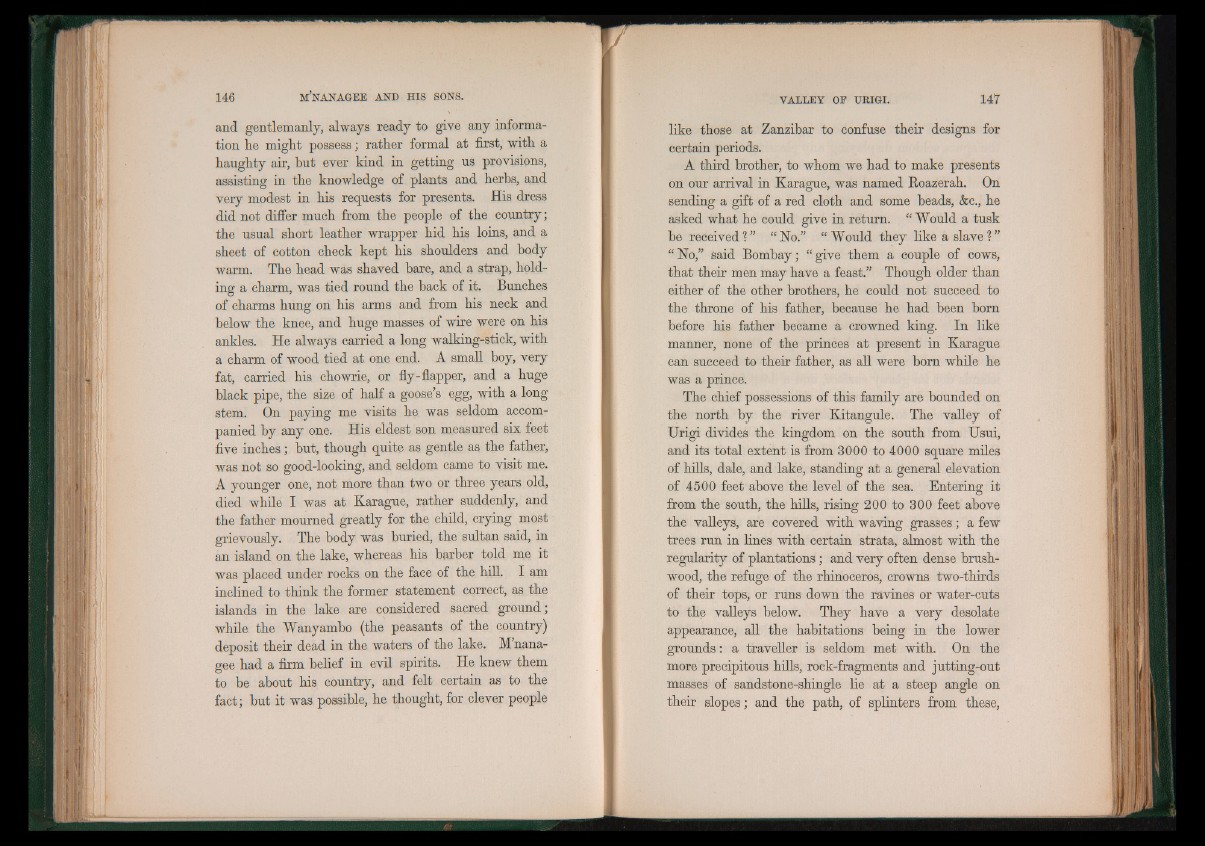
and gentlemanly, always ready to give any information
lie might possess; rather formal at first, with a
haughty air, hut ever kind in getting us provisions,
assisting in the knowledge of plants and herbs, and
very modest in his requests for presents. His dress
did not differ much from the people of the country;
the usual short leather wrapper hid his loins, and a
sheet of cotton check kept his shoulders and body
warm. The head was shaved hare, and a strap, holding
a charm, was tied round the back of it. Bunches
of charms hung on his arms and from his neck and
below the knee, and huge masses of wire were on his
ankles. He always carried a long walking-stick, with
a charm of wood tied at one end. A small hoy, very
fat, carried his chowrie, or fly-flapper, and a huge
black pipe, the size of half a goose’s egg, with a long
stem. On paying me visits he was seldom accompanied
by any one. His eldest son measured six feet
five inches; but, though quite as gentle as the father,
was not so good-looking, and seldom came to visit me.
A younger one, not more than two or three years old,
died while I was at Karague, rather suddenly, and
the father mourned greatly for the child, crying most
grievously. The body was buried, the sultan said, in
an island on the lake, whereas his barber told me it
was placed under rocks on the face of the hill. I am
inclined to think the former statement correct, as the
islands in the lake are considered sacred ground;
while the Wanyambo (the peasants of the country)
deposit their dead in the waters of the lake. M’nana-
gee had a firm belief in evil spirits. He knew them
to be about his country, and felt certain as to the
fact; but it was possible, he thought, for clever people
like those at Zanzibar to confuse their designs for
certain periods.
A third brother, to whom we had to make presents
on our arrival in Karague, was named Roazerah. On
sending a gift of a red cloth and some beads, &c., he
asked what he could give in return. “Would a tusk
be received?” “No.” “Would they like a slave?”
“No,” said Bombay; “ give them a couple of cows,
that their men may have a feast.” Though older than
either of the other brothers, he could not succeed to
the throne of his father, because he had been born
before his father became a crowned king. In like
manner, none of the princes at present in Karague
can succeed to their father, as all were born while he
was a prince.
The chief possessions of this family are bounded on
the north by the river Kitangule. The valley of
Urigi divides the kingdom on the south from Usui,
and its total extent is from 3000 to 4000 square miles
of hills, dale, and lake, standing at a general elevation
of 4500 feet above the level of the sea. Entering it
from the south, the hills, rising 200 to 300 feet above
the valleys, are covered with waving grasses; a few
trees run in lines with certain strata, almost with the
regularity of plantations; and very often dense brushwood,
the refuge of the rhinoceros, crowns two-thirds
of their tops, or runs down the ravines or water-cuts
to the valleys below. They have a very desolate
appearance, all the habitations being in the lower
grounds: a traveller is seldom met with. On the
more precipitous hills, rock-fragments and jutting-out
masses of sandstone-shingle lie at a steep angle on
their slopes; and the path, of splinters from these,